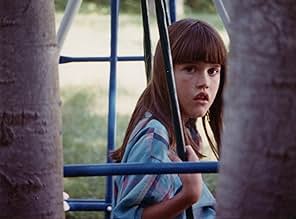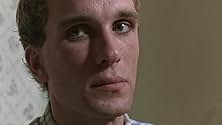NOTE IMDb
7,0/10
6,3 k
MA NOTE
Après qu'un homme souffrant de schizophrénie a été libéré d'un établissement psychiatrique, il tente de récupérer sa fille de sa famille adoptive.Après qu'un homme souffrant de schizophrénie a été libéré d'un établissement psychiatrique, il tente de récupérer sa fille de sa famille adoptive.Après qu'un homme souffrant de schizophrénie a été libéré d'un établissement psychiatrique, il tente de récupérer sa fille de sa famille adoptive.
- Récompenses
- 5 victoires et 6 nominations au total
Avis à la une
A scary, sad and terribly depressing movie. All of the performances are extremely true-to-life. The only thing I felt hurt this movie was the pacing, which was irregular at certain points. The camera work was very unusual.
If you've ever wanted a glimpse inside the head of a schizophrenic (which I doubt), this is the film. This movie dares to deal with subject matter that Hollywood would normally never touch. It is not an entertaining film and is extremely difficult to watch, but everything that happened in the movie could easily happen in "real life." There is nothing phony here, nothing pretensive, just an incredibly realistic portrayal of the pain of everyday life, and especially the pain of one young schizophrenic man.
I gave this movie 7/10 for its pacing and somewhat weak plot, yet in a sense it deserves a much higher rating. I gave it 7/10 because I didn't enjoy it... yet it was difficult to tear my eyes away at times. The last 30 minutes of the film are the best... the pacing improves, and the story is at last resolved. I breathed a sigh of relief when this movie ended. This kind of gritty realism is just too hard to watch, but its uncompromising honesty is worthy of a great deal of credit. Painful and difficult to watch, but if you like a film that is utterly honest and doesn't play with your emotions, I recommend you see it. Not for the faint of heart, though.
If you've ever wanted a glimpse inside the head of a schizophrenic (which I doubt), this is the film. This movie dares to deal with subject matter that Hollywood would normally never touch. It is not an entertaining film and is extremely difficult to watch, but everything that happened in the movie could easily happen in "real life." There is nothing phony here, nothing pretensive, just an incredibly realistic portrayal of the pain of everyday life, and especially the pain of one young schizophrenic man.
I gave this movie 7/10 for its pacing and somewhat weak plot, yet in a sense it deserves a much higher rating. I gave it 7/10 because I didn't enjoy it... yet it was difficult to tear my eyes away at times. The last 30 minutes of the film are the best... the pacing improves, and the story is at last resolved. I breathed a sigh of relief when this movie ended. This kind of gritty realism is just too hard to watch, but its uncompromising honesty is worthy of a great deal of credit. Painful and difficult to watch, but if you like a film that is utterly honest and doesn't play with your emotions, I recommend you see it. Not for the faint of heart, though.
I rented this movie a few years ago, and fell in love with it. Peter Greene steps out of his normal "tough, bad guy" Hollywood roles to play a sensitive father handicapped by schizophrenia.He is recently released from a hospital and reuniting with his daughter becomes his main focus.Unfortunately, we soon learn that its hard for him to focus as sweet hope soon turns tragic. All he wants is to be a good father, something his ailment makes him incapable of. I love the way the director visualizes the schizophrenic moments. If you are looking for something off the beaten path I highly recommend it. 10/10stars
I will never forget this movie - it chills me every time I see it. What I like most about it is that it contains very little dialogue (unlike "Cube") and is not very visually stylish (unlike "Pi"); the buzzes, static, and blurred radio broadcasts allow direct access into the protagonist's schizophrenic mind as he tries to remain somewhat sane while searching for his daughter given up for adoption by his mother. Peter Greene gives a stunning performance. Only a slightly formulaic ending mars this intense work of art; I cannot wait to see what director Lodge Kerrigan does next.
This is a small indie by Lodge Kerrigan made in 94. Kerrigan's recent film Keane was astonishing (as was Damian Lewis). Like Keane, this film features a genuinely real and captivating performance by an actor playing a schizophrenic. The film's movement is fragmentary, roped together by a soundtrack that reveals the voices we might suppose are echoing within our character's unbound mind. His actions are confusing to him, and make us increasingly reluctant to watch, as watching makes us complicit with what he does, which is bad.
The use of sound in this film practically makes it worth watching in its own right, pun intended. In the critic's video essay that accompanies the Criterion release of this film, which is pitched to grad level film students (and that's not a complaint), Michael Atkinson remarks that the director uses "objective" sound, not "subjective" sound. It's true that the sounds that fill the film's soundtrack are given us from the external world, often through the protagonist's car radio and sometimes simply through the ether. But I'd disagree with Atkinson. I don't think this is just use of objective sound to a parallel the film's fragmented and "subject-less" subject and narrative. Yes, it's a different use of sound, but it's a complication of subjective sound, not a departure from it. After all we hear the soundtrack, and therefore we can't but believe that the subject hears them.
The use of sound here is interesting, I think, because the protagonist is not hearing them but producing them. We're given the sounds as he hears them, but they echo and resound within his schizophrenic mind, as they are the schizophrenic's world. Voices unattributed, perhaps real, perhaps recollected, but certainly not sounds that anchor the schizophrenic to reality. Rather, sounds that divorce him from the world, catching him as abruptly as an unexpected blow to the head. Short, sharp, shocks that knock about and bring into consciousness commands, put-downs, and other forms of verbal punishment that trouble us for their detachment. We don't know who's saying them. Which means we don't know why they are being said, which means (as Atkinson notes), we don't know what to think of them.
Where Atkinson hangs these sounds on a reel of film though, my sense is that they should be hung on memory, which is not a reel of film, is certainly subjective, if not multiply subjective, and is not objective in the slightest for the simple reason that memories can't be. Our schizophrenic protagonist's relation to sound is that he's caught in a compulsive listening, but cannot hear. The coup in Kerrigan's sonic genius, I think, is that in memory is the protagonist's pain, and it's a pain he suffers, often, without making the slightest of sound. But for the one that we hear.
The use of sound in this film practically makes it worth watching in its own right, pun intended. In the critic's video essay that accompanies the Criterion release of this film, which is pitched to grad level film students (and that's not a complaint), Michael Atkinson remarks that the director uses "objective" sound, not "subjective" sound. It's true that the sounds that fill the film's soundtrack are given us from the external world, often through the protagonist's car radio and sometimes simply through the ether. But I'd disagree with Atkinson. I don't think this is just use of objective sound to a parallel the film's fragmented and "subject-less" subject and narrative. Yes, it's a different use of sound, but it's a complication of subjective sound, not a departure from it. After all we hear the soundtrack, and therefore we can't but believe that the subject hears them.
The use of sound here is interesting, I think, because the protagonist is not hearing them but producing them. We're given the sounds as he hears them, but they echo and resound within his schizophrenic mind, as they are the schizophrenic's world. Voices unattributed, perhaps real, perhaps recollected, but certainly not sounds that anchor the schizophrenic to reality. Rather, sounds that divorce him from the world, catching him as abruptly as an unexpected blow to the head. Short, sharp, shocks that knock about and bring into consciousness commands, put-downs, and other forms of verbal punishment that trouble us for their detachment. We don't know who's saying them. Which means we don't know why they are being said, which means (as Atkinson notes), we don't know what to think of them.
Where Atkinson hangs these sounds on a reel of film though, my sense is that they should be hung on memory, which is not a reel of film, is certainly subjective, if not multiply subjective, and is not objective in the slightest for the simple reason that memories can't be. Our schizophrenic protagonist's relation to sound is that he's caught in a compulsive listening, but cannot hear. The coup in Kerrigan's sonic genius, I think, is that in memory is the protagonist's pain, and it's a pain he suffers, often, without making the slightest of sound. But for the one that we hear.
one of my alltime-favorites!! I´ve seen it years ago and it still haunts me. this is what real film-making is about, this is how it is supposed to be. lodge kerrigan is a true master, and it´s a pity he hasn´t done anything in years, except CLAIRE DOLAN which is true genius as well. peter "zed" greene gives a landmark performance and it seems that he suffers the same fate like malcolm mcdowell after CLOCKWORK ORANGE: being one of the best but underrated actors of his time but without a second chance to prove it.
anyway, if you wanna "feel" - not just see - what mental illness is all about, check this out.
anyway, if you wanna "feel" - not just see - what mental illness is all about, check this out.
Le saviez-vous
- AnecdotesPeter Greene's first line comes eighteen minutes into the movie.
- GaffesThe steering column shifter knob in Peter's car is missing. Then it reappears.
- Citations
Peter Winter: I was in a, in a hospital bed, and I had been operated on. And they had put a, a small receiver in the back of my head and a transmitter in my finger. You know what they are?
Nicole Winter: A radio?
Peter Winter: Yeah, a radio. Anyway, to get at the transmitter, I had to take my fingernail off.
Meilleurs choix
Connectez-vous pour évaluer et suivre la liste de favoris afin de recevoir des recommandations personnalisées
- How long is Clean, Shaven?Alimenté par Alexa
Détails
Box-office
- Budget
- 68 000 $US (estimé)
- Montant brut aux États-Unis et au Canada
- 26 351 $US
- Montant brut mondial
- 26 351 $US
Contribuer à cette page
Suggérer une modification ou ajouter du contenu manquant

Lacune principale
By what name was Clean, Shaven (1993) officially released in India in English?
Répondre



























